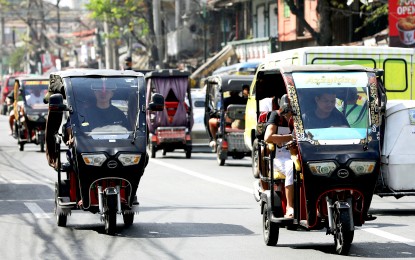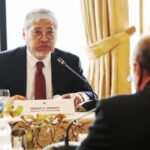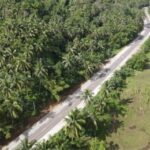MANILA — The Metropolitan Manila Council is set to issue a resolution regulating the use of electric vehicles, particularly on major thoroughfares.
The director of the Metropolitan Manila Development Authority’s Traffic Safety Group stated that the resolution, which will be presented for discussion and approval next week, will include fines and penalties imposed on electric vehicle users.
The director mentioned that the resolution aims to align local government policies on e-trikes with those of the national government.
«Last week, a technical working group meeting was held, and all agreed to harmonize local government policies on e-trikes with the national government’s policies, including those of the Department of Transportation, Land Transportation Office, and Land Transportation Franchising and Regulatory Board,» he said during a briefing.
He noted that there is an LTO circular from 2021 outlining guidelines for regulating e-bikes but lacks corresponding penalties for violations.
«It only specifies where they are allowed to operate but does not include concrete penalties for violations. That’s the problem—there are no defined fines for them,» he said.
«But now, with recent initiatives, we will include fines and penalties as we enhance regulations pertaining to e-trikes and even tricycles, as we see not only e-trikes but also tricycles on national roads,» he added.
According to the director, even before the pandemic, several Metro Manila local governments had already enacted ordinances regulating e-trikes.
«We considered their provisions on this matter. Some LGUs do not yet have such ordinances and will only draft them after the Metro Manila Council resolution is issued. They will base their ordinances on this,» he said.
Several social media posts have raised concerns about the proliferation of e-bikes, with some operating on national highways without protective gear.
Such vehicles, including tricycles, are prohibited from using main roads and national highways as they pose risks to other motorists.
«We are not discriminating against them. We simply need to regulate this to promote road safety. We hope that next week, the MMDA’s proposal to the Metropolitan Manila Council on regulating e-trikes, tricycles, and similar vehicles on national roads—with penalties and fines—will be approved,» he said.
Previously, the LTO chief mentioned that possible requirements under consideration include the registration of e-bikes and the need for driver’s licenses.
Metropolitan Manila Council
The Metropolitan Manila Council (MMC) is the governing and policy-making body of the Metropolitan Manila Development Authority (MMDA), which oversees planning, transport, and infrastructure in Metro Manila. Established in 1975 under Presidential Decree No. 824, it was created to coordinate services across the region’s 16 cities and one municipality. The council is composed of mayors from these local government units, along with key officials, working to address urban challenges in the Philippine capital.
Metropolitan Manila Development Authority
The **Metropolitan Manila Development Authority (MMDA)** is a government agency in the Philippines responsible for managing urban development, traffic, and public services in Metro Manila. Established in 1975 as the Metro Manila Commission and later reorganized in 1990, the MMDA addresses metropolitan-wide issues such as flood control, waste management, and transportation planning. It plays a key role in coordinating policies among the cities and municipalities of the National Capital Region.
Department of Transportation
The **U.S. Department of Transportation (DOT)** is a federal agency established in 1966 to oversee and regulate transportation systems, including highways, aviation, and railroads, ensuring safety and efficiency. It was created in response to the growing need for coordinated national transportation policies. Today, the DOT manages infrastructure projects, enforces transportation laws, and promotes innovation in areas like autonomous vehicles and sustainable transit.
Land Transportation Office
The **Land Transportation Office (LTO)** is a Philippine government agency under the Department of Transportation responsible for vehicle registration, driver’s licensing, and road safety enforcement. Established in 1964, it oversees land transport regulations to ensure efficient and safe transportation systems nationwide. The LTO plays a key role in traffic management and public compliance with transportation laws.
Land Transportation Franchising and Regulatory Board
The **Land Transportation Franchising and Regulatory Board (LTFRB)** is a Philippine government agency responsible for regulating public land transportation services, including buses, jeepneys, and taxis. Established in 1987 under Executive Order No. 202, it oversees franchise issuance, route planning, and fare regulation to ensure safe and efficient public transport. The LTFRB plays a key role in modernizing transportation systems and addressing industry challenges in the Philippines.
Tondo, Manila
Tondo is a historic district in Manila, Philippines, known as one of the oldest areas in the city. It was a thriving trade hub before Spanish colonization and later became a center of resistance during colonial rule. Today, Tondo is a densely populated urban area, often associated with poverty but also rich in cultural heritage and resilience.
Manila
Manila, the capital of the Philippines, is a vibrant city with a rich history dating back to its founding in 1571 by Spanish conquistadors. Known for its blend of colonial architecture and modern skyscrapers, it features historic sites like Intramuros, a walled city from the Spanish era, and Rizal Park, dedicated to the national hero José Rizal. Today, Manila is a bustling cultural and economic hub, reflecting centuries of Spanish, American, and Filipino influences.
Metro Manila
Metro Manila, the bustling capital region of the Philippines, is a densely populated metropolis composed of 16 cities and one municipality. Established in 1975, it serves as the country’s political, economic, and cultural hub, with historic landmarks like Intramuros (a Spanish colonial walled city) and modern skyscrapers. The area has grown from a pre-colonial settlement into a vibrant, fast-paced urban center, though it faces challenges like traffic congestion and inequality.






